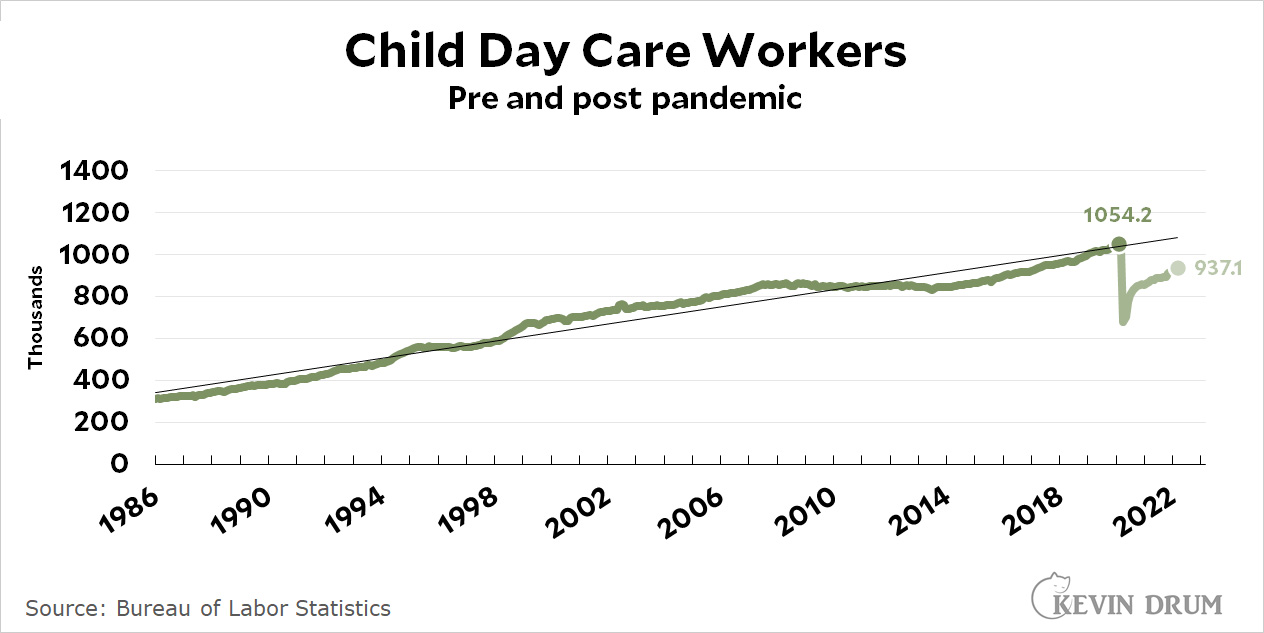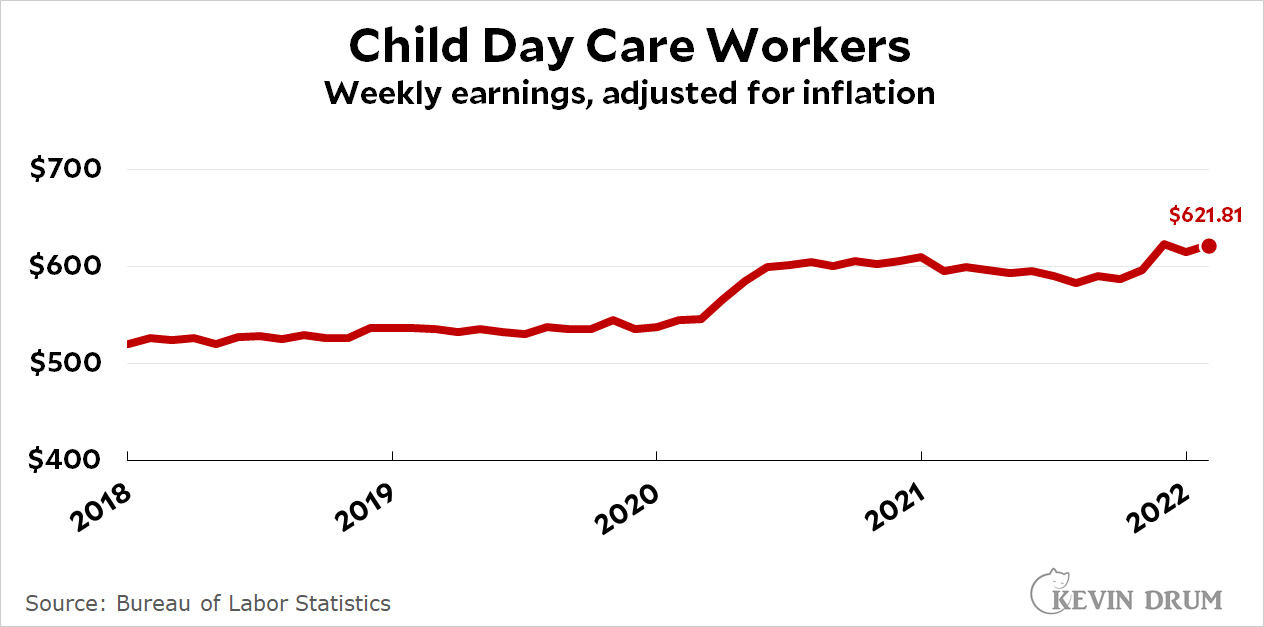A couple of days ago I mentioned that, in general, our prime-age labor force was now almost completely back to work. One smallish exception was prime-age women, many of whom had dropped out of the workforce and were no longer being counted.
The most likely explanation for this has to do with the continuing shortage of child care workers:
 As you can see, we're short about 1.4 million child care workers. At a horseback guess, a single child care worker can handle about four families (assuming 1.5 small children per family), which means the worker shortage affects about 5-6 million families. Some of them find help from friends or relatives, but probably around 2-3 million can't. Women are disproportionately responsible for child care, so it's likely that 2-3 million mothers exited the labor force entirely to take care of their children.
As you can see, we're short about 1.4 million child care workers. At a horseback guess, a single child care worker can handle about four families (assuming 1.5 small children per family), which means the worker shortage affects about 5-6 million families. Some of them find help from friends or relatives, but probably around 2-3 million can't. Women are disproportionately responsible for child care, so it's likely that 2-3 million mothers exited the labor force entirely to take care of their children.
So what are we doing to attract more child care workers? Here's what their pay looks like:
 Pay went up when the pandemic began, but a big shortage surfaced again in late 2021 when businesses re-opened and more mothers wanted to return to outside work. At that point, pay went up about 5%. On the bright side, this shows that the child care industry is reacting to its worker shortage. On the not-so-bright side, it's only a raise of 80 cents per hour. That's not nothing, but it's not going to stock your shelves with Beluga caviar either.
Pay went up when the pandemic began, but a big shortage surfaced again in late 2021 when businesses re-opened and more mothers wanted to return to outside work. At that point, pay went up about 5%. On the bright side, this shows that the child care industry is reacting to its worker shortage. On the not-so-bright side, it's only a raise of 80 cents per hour. That's not nothing, but it's not going to stock your shelves with Beluga caviar either.

In the first graph—number of daycare workers— I think the left-side axis labels are off by a factor of ten.
I don't think the graph is off; I think Kevin's numbers are off. The peak number of child daycare workers was about 1,054,000 and now we have about 117,000 fewer. It seems to be an ill defined term. Poking around the net I find estimates for a total of anywhere between 202K and 1,217K child daycare workers. No matter how you look at it we can't be missing 1,400k.
Anyway, he needs to re-evaluate the argument.
Interesting choice if comparison there, from the standpoint of both economic and ecological excess…
And at the other end of the age spectrum, there is a shortage of home health care workers to assist the elderly.
And both of these shortages are tied to the rise in housing costs in many places. In our area, it's the help for the elderly who are most in demand, because the demographics skew older. Retirees and second-home vacationers have driven up the price of houses, but many need home health aides and house cleaners, many of whom can't find a place to live. It's a malicious circle.
Accepting that 2-3 million mothers are staying out of the workforce: Probably some are staying out because they can't find childcare, but maybe others have found it is okay not to be in the workforce.
Suppose you are fortunate enough to have a partner making enough and you find that without childcare costs and with the time to shop more carefully and do some more home cooking, the expenses nearly wash out? Suppose you find that the loss of office camaraderie is balanced with the loss of office stress? Suppose you find you can make a little money on the side from home? Suppose you find you like spending more time with your kids?
I'm a 65 year old man so I can't claim any personal knowledge about motherhood. I will say that most places of employment have been on a downhill slide since the 1970s in terms of treating employees well. The great American project has been to make all jobs suck to the greatest degree possible. We should congratulate those who escape. If a million or two mothers have escaped, then good for them!
That's all fine and good but then your husband decides to trade you in for a younger model and you've been out of the workforce and it's hard to jump back in at the level you were.
My wife was working in childcare and quit due to the pandemic. The pay raises Kevin talks about were only offered to new employees, breeding discontent among existing employees. The chance of catching COVID from the kids was huge and conditions were onerous: crowded, lack of ventilation, increased cleaning regulations falling on smaller numbers of staff, long hours, etc. Even with the increased pay it is ridiculously low, yet on the other side a lot of families can't pay for the cost increases passed on to them.
***********SLIGHTLY OT********************************
Well, the damn burst over the last few days
At our county level - county government is listed as one of the top 5 employers within the county. (Same for the city - City of Wilmington is a top 10 employer).
In the last couple of days New Hanover County NC announced STUNNING pay raises for emergency responders to help maintain the employees they have.
NH County sheriffs, and fire dept will receive 30% pay increases. 9-1-1 call center employees will receive 18% pay increases. According to the news NO EMPLOYEE within the NH County government system will make LESS than $26K per year !!!
Now, this is AFTER teachers got county stipends in addition to pay raises from the state.
Across the river in Brunswick county they did something similar yesterday but instead of % increases they moved people into new paygrades. (Brunswick county is one of the top 10 fastest growing counties in the United States)
Here's a link to this news article:
https://www.wect.com/2022/04/18/brunswick-county-commissioners-consider-employee-pay-increases/
{snip}
The absolute minimum salary would increase from $25,979 to $30,098, and the absolute maximum salary would increase from $231,016 to $282,238 at the highest pay grade (grade 45).
{snip}
Now, think for a moment. FORGET all the "prime aged worker" stuff and population demographics stuff. These entities cannot hire, train, and RETAIN employees and they are LARGE employers. This will have a big affect on "average" wages paid because of the sheer numbers of employees involved. There are very FEW government employees at the lower pay scales.
I suspect this will be in the news more frequently as governments struggle to retain workers. THIS is what will drive "average wages up" more so than anything else,
BTW (I hate responding to myself)
This is on TOP of paid BC/BS for employees, accrued sick time off (which you can carry over "X" amount of hours per year). Accrued vacation time which can build up to allow yourself to "retire" early and collect full vacation pay for the year before your "official" retirement date AND a pension plan !!
621 equates to about 15 dollars a hour- minimum wage. That's it. A joke.
My wife was making $12 an hour, some health benefits at least. It was probably the premier childcare service in the area, but employees were getting sick left and right and could see the writing on the wall. From what I hear they have had to close down the location due to lack of employees.